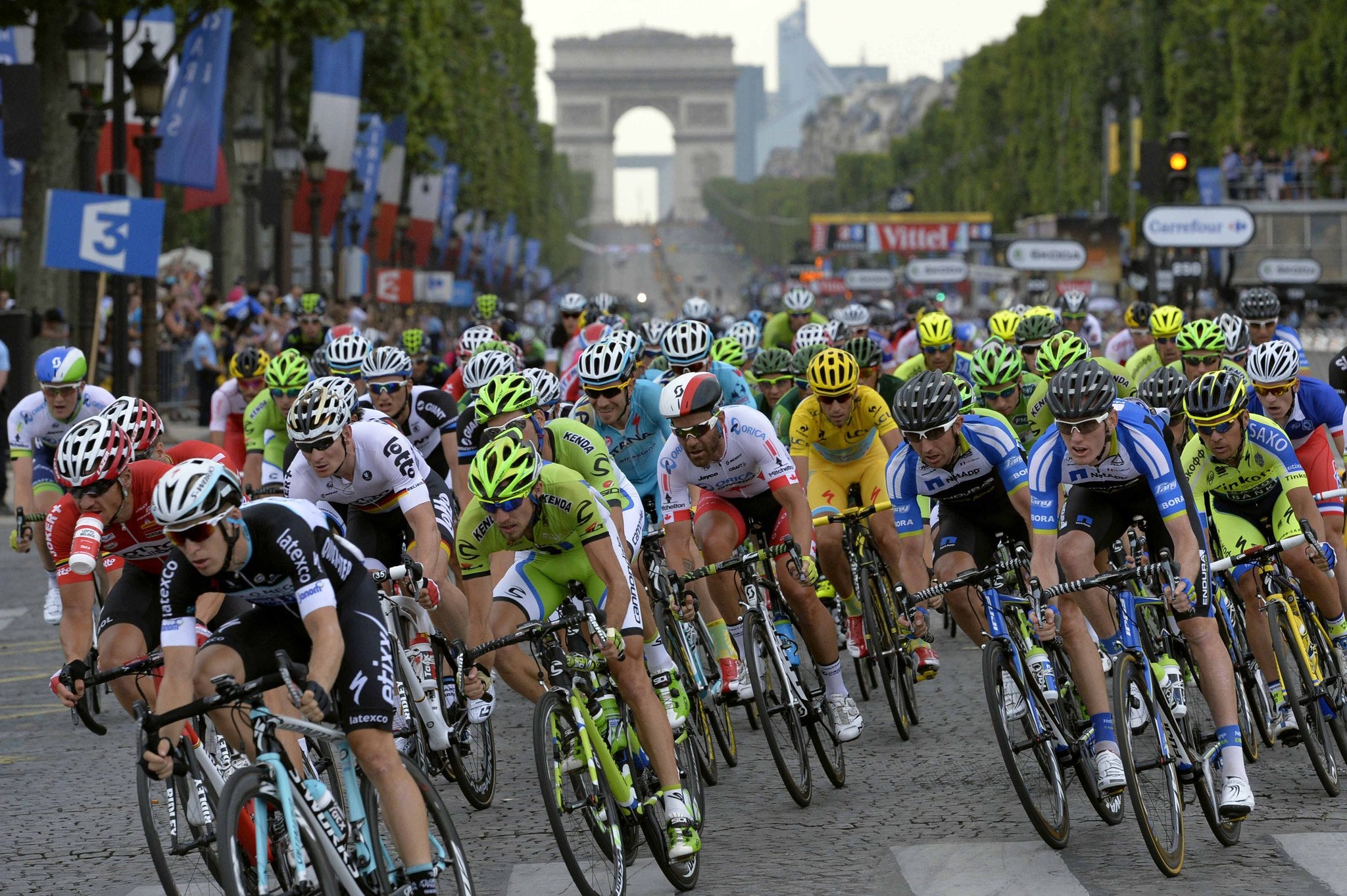A lot of bicycles and balls: Simon Redfern takes a look at this summer’s best new sport books
Pedal power. Riders in this year’s Tour de France AFP

Your support helps us to tell the story
From reproductive rights to climate change to Big Tech, The Independent is on the ground when the story is developing. Whether it's investigating the financials of Elon Musk's pro-Trump PAC or producing our latest documentary, 'The A Word', which shines a light on the American women fighting for reproductive rights, we know how important it is to parse out the facts from the messaging.
At such a critical moment in US history, we need reporters on the ground. Your donation allows us to keep sending journalists to speak to both sides of the story.
The Independent is trusted by Americans across the entire political spectrum. And unlike many other quality news outlets, we choose not to lock Americans out of our reporting and analysis with paywalls. We believe quality journalism should be available to everyone, paid for by those who can afford it.
Your support makes all the difference.The British cycling boom shows no sign of slowing, with 2.1 million regular riders in England alone.
The number of books devoted to the sport continues to gather pace as well, but Nicole Cooke’s autobiography, The Breakaway (Simon & Schuster, £20), is a sharp reminder of just how tough life on two wheels can be. In 2008, the Welsh rider became the only cyclist to win world and Olympic road-race titles in the same year, but felt her successes came despite, rather than because of, British Cycling’s administrators at the time, as chapters entitled: “The GB Plan: Stop That Girl!” and “The Laurel and Hardy Support Team” indicate. Demanding, often chippy, she nevertheless did more than practically anyone else to champion the rights of female cyclists, and spoke out loudly and often against the drug-taking she says was endemic on the women’s circuit as well as the men’s.
The memoirs of another committed British anti-doper, last year’s Tour de France winner Chris Froome, are riding high in the best-seller charts despite his early exit from this year’s Tour after crashing. While his revelations in The Climb (Viking, £20) of the depth of his rift with fellow Sky team-mate and 2012 Tour winner Sir Bradley Wiggins made headlines, the mental toughness that Froome displayed in rising from the cycling wilderness in Kenya to the pinnacle is even more noteworthy.
And spare a thought for the slowest finishers in Le Tour, but don’t pity them, says Max Leonard in Lanterne Rouge (Yellow Jersey, £16.99); the last man home has still achieved more than the many who abandoned the effort. In this lively, rear-view account of largely unsung heroes, and a few villains, Leonard has managed the difficult feat of coming up with an original angle on Le Tour.
Originality is a quality not often found in footballers’ memoirs, and it is largely foreign players who have proved the exception recently. Last year’s hit was the brilliantly bombastic I Am Zlatan Ibrahimovic (Penguin, £8.99), in which the Swedish striker smote all and sundry, and this summer Andrea Pirlo has provided an equally quirky and opinionated, if less savage, view of life at the top of “the beautiful game” in I Think Therefore I Play (BackPage Press, £9.99). Italy’s peerless playmaker appears a more laidback soul than Zlatan, observing: “I don’t feel pressure. I spent the afternoon of Sunday 9 July 2006 in Berlin sleeping and playing the PlayStation. In the evening I went out and won the World Cup.” His dislike of too much unnecessary exertion extends to pre-match warm-ups, which he regards as “nothing but masturbation for conditioning coaches”.
Knockabout stuff at a lower level from Lutz Pfannenstiel in The Unstoppable Keeper (VSP, £12.99). The German is the only footballer to have played in all six Fifa confederations, during a career pinballing crazily from Albania to Brazil, with many detours along the way. In Singapore, he spent 101 days in jail after being accused of match-fixing; in New Zealand, he kidnapped a penguin which he kept in his bath; and on one of his occasional sojourns in England, his heart stopped beating three times after a collision while he was playing for Bradford Park Avenue in the Northern Premier League. Plenty of laughs if not much introspection, but none the worse for that.
Kevin Pietersen is also currently globetrotting. Should he still be playing Test cricket for England instead? Would he want to? In On Pietersen (Simon & Schuster, £16.99) none of the protagonists involved in the fall from grace of England’s most prolific batsman emerge unscathed: while Pietersen is criticised for lacking empathy, the England management is portrayed as by turns vindictive, dithering, and displaying the same disconnected tendencies they accused Pietersen of. Simon Wilde ultimately refuses to come down in favour of either side, saying Pietersen ranks as “without doubt one of cricket’s great entertainers. This … should be his final epitaph”. Amen to that.
Amen also to Hedley Verity, regarded by many judges as England’s greatest spin bowler, who was killed, aged 38, in the Second World War. In 10 for 10 (John Wisden, £10.99) Chris Waters uses the Yorkshire left-armer’s wondrously symmetrical bowling figures against Nottinghamshire in 1932 as a springboard to bringing luminously back to life the career of a man about whom nobody seems to have had a bad word to say.
From a little gem to a splendidly baggy doorstop. Rob Steen’s ambitious brief in Floodlights and Touchlines (Bloomsbury, £25) is to chronicle the history of spectator sport, which gives him licence to discuss just about any form of contest you care to name. The result is a passionate, thought-provoking view of sport’s place in our lives.
A lot of bicycles and balls
pedal power
Riders in this year’s Tour de France AFP
Join our commenting forum
Join thought-provoking conversations, follow other Independent readers and see their replies
Comments